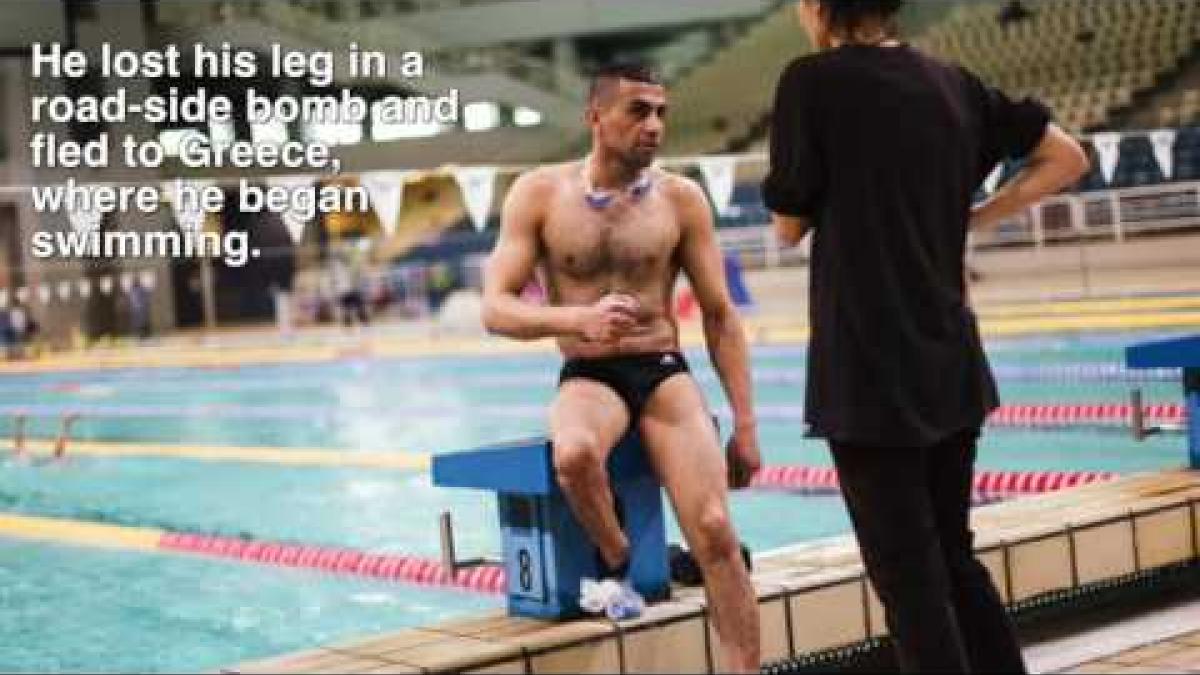Refugee swimmer Al-Hussein: 2016 ‘the best year of my life’
Ibrahim Al-Hussein represented refugees everywhere when he competed at Rio 2016, and has been reflecting on an amazing 12 months. 29 Nov 2016“I cannot imagine my life without sport. I can stop from eating but I cannot stop having sport in my life. It is what keeps me going on."
Syrian refugee swimmer Ibrahim Al-Hussein has said that 2016 was the best year of his life after he competed at the Rio 2016 Paralympic Games as part of the Independent Paralympic Athletes (IPA) Team.
Al-Hussein, who was one of two refugee and asylee Para athletes to travel to Brazil, has also vowed that the Paralympics are only just the beginning.
“2016 was definitely the best year of my life. But Rio was just the start,” Al-Hussein said. “All these years of hard training and dedication as a child and competing nearly came to a stop when I got injured, but I kept going on and it all came together in Rio which was the highest point in my life.”
Al-Hussein is just one of many refugees with an impairment who could be given life-changing access to Para sport. You can help others by making a donation here: https://www.generosity.com/
A keen swimmer and judoka, Al-Hussein fled to Athens, Greece, in 2013 after he lost his leg in a bomb blast in his home town of Deir al-Zour. He had been tending to an injured friend in the street. A few months later, a lack of treatment and medication forced him to leave Syria and he travelled through Turkey before making the perilous journey to Greece by boat.
He began his transformation into an icon for the refugee population when he participated in the Olympic Torch relay for Rio 2016, carrying the flame through the Eleonas refugee camp in Athens. He was then given the chance to realise his dream of competing at the highest level when he became part of the IPA Team.
With the eyes of the world upon him, he competed in men’s S9 swimming events in Rio, reaching personal bests in the 50m and 100m freestyle.
He spoke of his personal and professional transformations both during the Paralympics and since returning to Greece, where he still works in a café whilst training full-time.
“Since I returned from Rio my life has taken a 360 degree turn. It opened doors for me,” the 28-year-old said. “I took the opportunity to learn as much as I could. I watched other swimmers in training and during competition to learn from them. Now I am doing more focused in my training, taking a more tactical approach and improving my technique.
“People know about me more, they recognise me. And people take more care of me now.”
Speaking of the high points of what has been a whirlwind 12 months, Al-Hussein is grateful for the vast range of friendships he has made along the way, as well as the recognition he has achieved.
He competed in Rio alongside Iranian-born Shahrad Nasajpour. Both athletes were supported by a Chef de Mission, coaching and support staff. They also got to compete alongside and meet the world’s best athletes during the Paralympics.
“My highlights were the friendships I built, and the athletes I met. These are the most important things to me, as well as what I learnt about the sport and everything I got to do around it, such as receiving the Whan Young Dai Award.”
As for his future goals, Al-Hussein’s next major target is the 2017 World Para Swimming Championships in Mexico City in September. He has already begun preparing and is targeting swims in the 50m and 100m freestyle, and 100m backstroke where he plans to improve on his performances from Rio 2016.
For fellow refugees with impairments, Al-Hussein had a simple message.
“I cannot imagine my life without sport. I can stop from eating but I cannot stop having sport in my life. It is what keeps me going on.
“Everyone should get involved in sports. They should go back to their clubs when they can. Nothing is too difficult and there is no disability.
“Everything can be overcome.”
The development arm of the International Paralympic Committee, the Agitos Foundation, aims to raise EUR 25,000 between 29 November – 3 December towards helping refugees with impairments into Para sport in Greece, Cyprus and Serbia. The project is supported by the UN’s Refugee Agency, the UNHCR, and Athens University.
The project will provide information about Para sport to agencies running the refugee camps; register refugees, especially children, with impairments; give refugees the chance to learn about the Paralympic Movement; organise a training camp and grow a network to ensure that refugees with impairments have access to sport programmes and competitions.
The fundraising will conclude at the end of the UN’s International Day of Persons with Disabilities on 3 December. Donate now to help ensure refugees with impairments are not left behind.
__
A series of stories about refugees and the IPA Team will be published at Agitos Foundation's website as well as videos, pictures and updates at Facebook.com/agitosfoundation and Twitter @Agitos or by searching #TeamAgitos.








